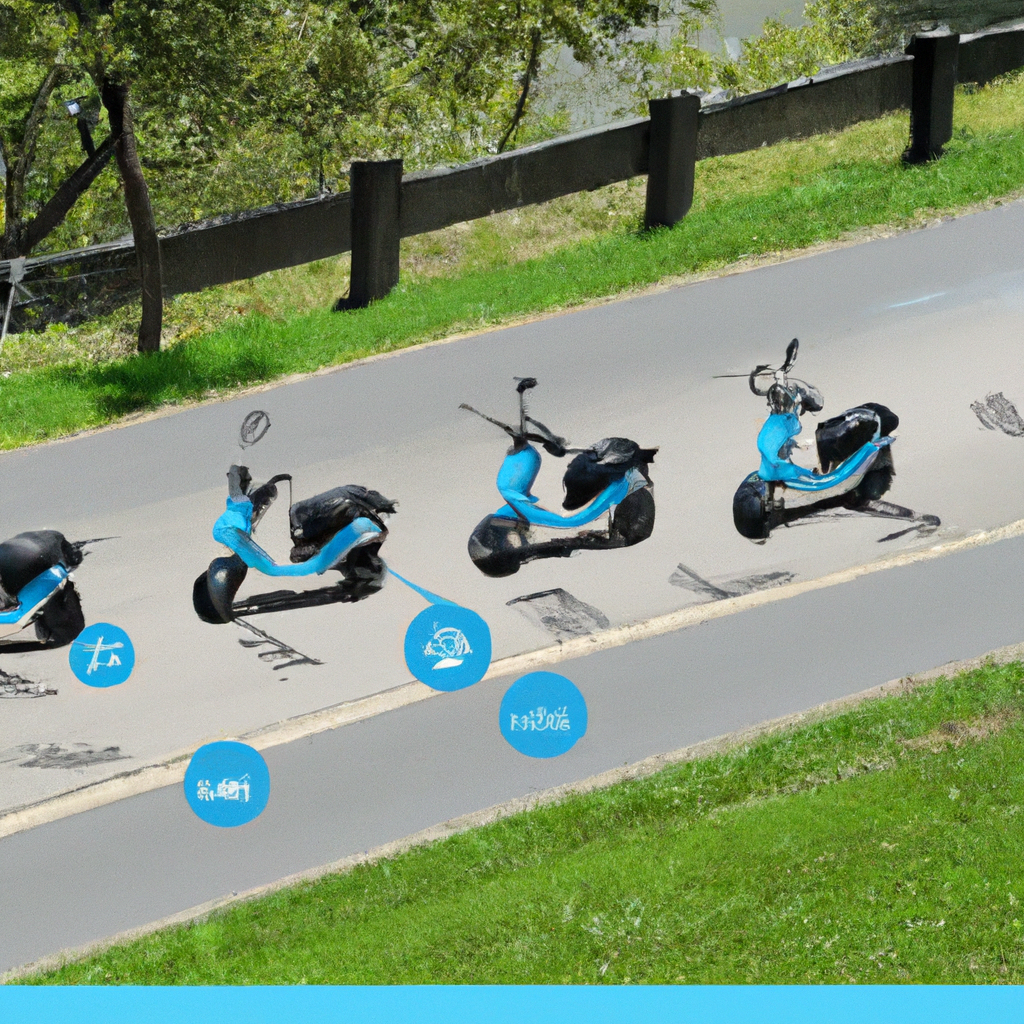Curious about the differences between electric scooters and electric bikes? Look no further! In this article, we will explore the key distinctions between these two popular modes of transportation. From speed and range to comfort and versatility, you’ll discover everything you need to know to make an informed decision. Whether you’re contemplating a new commuter vehicle or simply interested in the world of electric mobility, keep reading to find out how electric scooters measure up against electric bikes.

Cost
Initial cost
Electric scooters generally have a lower initial cost compared to electric bikes. This is because electric scooters are typically smaller and have less complex components. You can find a variety of electric scooters on the market with a wide range of prices, allowing you to choose one that suits your budget.
Maintenance cost
In terms of maintenance cost, electric scooters tend to be more affordable compared to electric bikes. The simplicity of their design means fewer parts that can potentially wear out or require maintenance. Additionally, electric scooters often have fewer moving parts, reducing the likelihood of mechanical issues.
Running cost
Electric scooters are also more cost-effective when it comes to running costs. On average, it is cheaper to charge an electric scooter than it is to charge an electric bike. With the increasing availability of charging stations and affordable home charging options, it is relatively easy to keep your electric scooter powered up without breaking the bank.
Speed and Range
Top speed
While electric bikes can reach higher top speeds than electric scooters, scooters still offer ample speed for most commuting needs. Many electric scooters have a top speed ranging from 15 to 25 miles per hour, depending on the model. This allows you to zip through city streets and reach your destination in a timely manner.
Range per charge
The range per charge is an important factor to consider when comparing electric scooters and electric bikes. Electric bikes generally have a longer range due to their larger battery capacity. However, electric scooters still offer respectable range options, typically ranging from 15 to 40 miles per charge. This should be sufficient for most daily commuting needs.
Acceleration
Electric scooters often offer quick acceleration, making them ideal for navigating city traffic and getting ahead of the pack at stoplights. With their lightweight design and instant torque from the electric motor, electric scooters can get you up to speed and cruising in no time. This can provide a thrilling and efficient commuting experience.
Safety
Stability
When it comes to stability, electric bikes generally have an advantage over electric scooters due to their larger size and wider wheelbase. However, many electric scooters are built with stability in mind, featuring a low center of gravity and wide handlebars for better balance. It is important to choose a scooter with a sturdy construction and reliable braking system to ensure a safe ride.
Visibility
Electric scooters and electric bikes both prioritize visibility for rider safety. Many scooters feature built-in lights, reflective materials, and even turn signals to enhance visibility and make you more noticeable on the road. Additionally, wearing bright, reflective clothing and utilizing proper hand signals can further improve your visibility while riding.
Braking capabilities
Both electric scooters and electric bikes have advanced braking systems to ensure quick and safe stops. Most electric scooters feature disc brakes or regenerative braking systems, allowing you to stop smoothly and effectively. It is important to familiarize yourself with the braking mechanism of your scooter and practice proper braking techniques for optimal safety.
Maneuverability
Size and weight
Electric scooters are known for their compact size, making them incredibly maneuverable in urban environments. The lightweight design of electric scooters allows for easy navigation through traffic, tight turns, and weaving through pedestrians. This smaller size also makes it convenient to carry and store your scooter when needed.
Turning radius
Due to their smaller size and shorter wheelbase, electric scooters generally have a tighter turning radius compared to electric bikes. This allows you to navigate through narrow spaces, make sharp turns, and easily maneuver in crowded areas. Electric scooters excel in urban settings where agility and nimbleness are essential.
Parking and storage
One of the advantages of electric scooters is their ease of parking and storage. With their compact size, you can easily find parking spots that are not possible with larger vehicles. Electric scooters can be parked on sidewalks, in designated scooter parking areas, or even brought indoors for added security. Their smaller footprint also means they require less storage space when not in use.

Environmentally Friendly
Emissions
Both electric scooters and electric bikes are environmentally friendly options compared to traditional gasoline-powered vehicles. Electric scooters produce zero emissions, helping to reduce air pollution and contribute to a cleaner environment. By opting for an electric scooter, you are making a positive impact on the planet by reducing your carbon footprint.
Energy usage
Electric scooters are incredibly energy-efficient compared to electric bikes. Their smaller motors require less energy, resulting in longer battery life and reduced energy consumption. This efficiency translates to a more sustainable and cost-effective mode of transportation, as you can travel further on a single charge while using less energy.
Sustainable transportation
Choosing an electric scooter as your preferred mode of transportation promotes sustainable mobility. By utilizing electric power instead of fossil fuels, you are supporting the transition towards a greener future. Electric scooters are a practical solution for short commutes, providing a sustainable alternative to conventional vehicles and reducing overall traffic congestion.
Fitness Benefits
Physical activity level
While electric scooters do provide some physical activity through balancing and maneuvering, electric bikes offer greater potential for exercise. Electric scooters require less physical exertion, as they are primarily powered by the electric motor. However, riding an electric scooter still engages your core muscles and contributes to overall balance and coordination.
Calories burned
Electric scooters offer a moderate calorie burn compared to electric bikes. The level of effort required to ride an electric scooter is typically lower, resulting in fewer calories burned. However, if you opt for a scooter with manual propulsion capability, such as a kick scooter, you can increase your calorie burn by incorporating more leg power during your ride.
Cardiovascular health
While electric scooters may not provide the same cardiovascular benefits as electric bikes, they still offer an opportunity for light exercise and increased heart rate. Regular scooter riding can contribute to a healthier cardiovascular system, especially when combined with other forms of exercise in your daily routine. It is important to maintain an active lifestyle for overall fitness and well-being.

Terrain Adaptability
Road conditions
Electric scooters are well-suited for urban environments and smooth road conditions. They handle well on paved roads and sidewalks, providing a comfortable ride even on uneven surfaces. However, electric scooters may not be as suitable for rough terrains or off-road adventures. It is essential to consider your intended usage and the terrain you will encounter when choosing between an electric scooter and electric bike.
Off-road capabilities
While electric scooters are not specifically designed for off-road use, some models offer more robust tires and suspension systems that can handle light off-road conditions. These scooters can handle grassy trails or packed dirt paths. However, for more intense off-road adventures, electric bikes with larger tires and specialized off-road features tend to be a better option.
Uphill performance
Electric scooters generally have limited uphill performance compared to electric bikes. The smaller motors and compact design of scooters may struggle on steep inclines. However, many electric scooters still offer sufficient power and torque to handle moderate inclines encountered in urban environments. If you anticipate frequent uphill rides, an electric bike with a larger motor and more gears may be a more suitable choice.
Legal Restrictions
Licensing requirements
Electric scooters typically have fewer licensing requirements compared to electric bikes. In many jurisdictions, electric scooters fall under similar regulations as bicycles, meaning you may not require a driver’s license or specific scooter-related license to operate one. However, it is essential to familiarize yourself with local laws and regulations regarding electric scooter usage in your area.
Age restrictions
Electric scooter age restrictions can vary depending on local regulations. Some jurisdictions have age limits for riding electric scooters on public roads or sidewalks. Typically, these restrictions are in place to ensure the safety of younger riders who may have limited experience with motorized vehicles. Always check the age restrictions and guidelines specific to your location before allowing younger riders to operate electric scooters.
Public transportation usage
Electric scooters offer convenient options for public transportation usage. Their compact size and foldability allow for easy storage on buses, trains, and other forms of public transportation. Many cities and transport services have embraced electric scooters as a last-mile solution, enhancing the overall efficiency of existing public transportation systems.

Portability
Foldability
Portability is one of the significant advantages of electric scooters over electric bikes. Most electric scooters feature a foldable design, allowing you to collapse and stow them away quickly. This makes them ideal for commuters who need to bring their scooters onto public transportation, carry them up stairs, or store them in compact spaces.
Carrying capacity
Electric scooters generally have a lower carrying capacity compared to electric bikes. Due to their smaller frame and lightweight design, scooters are typically designed for a single rider. However, some electric scooters may offer additional attachments or accessories, such as baskets or cargo racks, to increase their carrying capacity and accommodate small items.
Public transportation compatibility
Electric scooters are highly compatible with various forms of public transportation. Their foldable nature allows for seamless integration into bus and subway systems. Commuters can effortlessly fold their scooters, bring them aboard, and continue their journey without hassle. This versatility makes electric scooters an excellent choice for multi-modal commuting.
Ease of Use
Learning curve
Electric scooters are easy to learn and operate, making them accessible to riders of all skill levels. Most scooters feature intuitive controls, such as a throttle and brake lever, which are familiar to anyone who has ridden a bicycle or motorcycle. Additionally, the relatively low speeds and simple handling of electric scooters contribute to their user-friendly nature.
Controls and interfaces
Electric scooters feature user-friendly controls and interfaces. The handlebars typically house the throttle, brake levers, and control panel, providing easy access to essential functions. Many electric scooters also include LED displays or smartphone apps that allow you to monitor battery life, speed, and other important information. These intuitive interfaces make operating an electric scooter a breeze.
Maintenance requirements
Electric scooters have minimal maintenance requirements, making them hassle-free to own and operate. Regular maintenance includes checking tire pressure, ensuring proper charging, and periodically inspecting brakes and other components for wear and tear. Compared to electric bikes, scooters generally require fewer tune-ups and repairs, helping to keep maintenance costs and efforts to a minimum.
In conclusion, electric scooters offer several advantages over electric bikes in terms of cost, maneuverability, and portability. They provide a cost-effective and eco-friendly transportation option for urban commuters. While electric bikes have their own benefits, electric scooters excel in navigating crowded cities, offering convenience, ease of use, and a fun way to get around. Whether you prioritize affordability, maneuverability, or environmental friendliness, electric scooters are a fantastic alternative to traditional forms of transportation.


